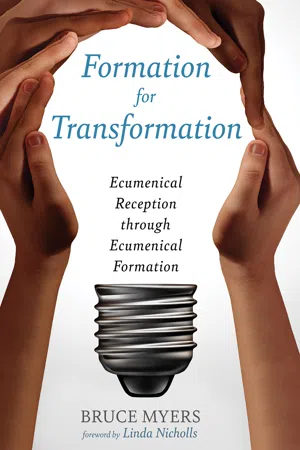![]()
1
Reception
If regarded from nothing other than a documentary standpoint, the last half-century of ecumenical conversations has been extraordinarily fruitful. Five tomes of ecumenical accords at the international level, collectively entitled Growth in Agreement, testify to just that: the ever-expanding degree of theological concordance reached among the largest and oldest of the separated churches in such once-divisive areas as Christology, pneumatology, salvation, sacraments, ministry, and authority. While marveling at the sheer volume of ecumenical agreements produced by bilateral and multilateral dialogues since the 1960s, the compilers of these anthologies of accords also acknowledge that in many cases these agreed statements risk having little life beyond the pages on which they are printed: “[I]f we do not want simply to mark time,” they warn, “our primary task in the years to come must indeed be the implementation of fellowship on the basis of the consensus reached.”
Many other prominent voices in the ecumenical movement have suggested that theological ecumenism of the kind expressed in the work of bilateral dialogues like the Anglican-Roman Catholic International Commission (ARCIC) and multilateral roundtables like the Faith and Order Commission of the World Council of Churches has reached at least a temporary limit in its usefulness, given “the apparent inability of the sponsoring churches to build and move forward on the basis of what the dialogues have accomplished.” William Rusch has said that what is needed is not for dialogues to produce more solutions to the problem of Christian division, but rather “to have the solutions that have been found become decisive in the churches.” Even as far back as the 1970s, which some today would still consider ecumenism’s heyday, Jürgen Moltmann lamented that, “At the present time, ecumenical theology seems to me to have developed to a point from which it can make no further headway unless there are changes in the churches’s praxis.” Thirty-five years later a worldwide gathering in Assisi, Italy, sought to address the very same quandary, namely that formal ecumenical dialogue “has come to seem productive at the highest levels among churches yet less than effectual as an influence both on pastoral practice and in the lives of people within churches.”
What each of these observers of the ecumenical landscape is pointing to is the issue of reception. Whether a convergence statement on baptism or a theological agreement on ministry, to be truly effective the good in question needs to come into the possession of its intended recipient in such a way that it is translated into something tangible, useful, and effective. It needs to be received.
This chapter will conduct a brief survey of the theological concept of reception. I will concentrate on its ecumenical application and focus further still on what a number of writers on the topic have regarded as its spiritual dimension, and discuss some of the implications of such an understanding, particularly with respect to the formation of those preparing for ordained ministry. In doing so I will highlight the inextricable connection between ecumenical reception and ecumenical formation.
Defining ‘Reception’ in Its Different Forms
William Rusch has wryly observed that, “Everyone knows what reception is until someone is called upon to furnish a short and specific definition.” At the risk of validating his claim, I will venture to offer a definition of reception. I will actually present three, ranging from general to very specific. The task of defining this term has been made less onerous by the considerable literature devoted to the topic, especially among ecumenists, over the past four decades.
In its broadest sense, reception is “a process by which some material or spiritual good of one part comes into the possession of another.” The term was first used this way in the seventeenth century to demonstrate the manner in which Roman law had been appropriated by the German legal system. It has also been enlisted by the field of literary studies to describe the process that takes place between a text and its reader.
Despite the term’s general applicability, however, reception as a concept has found its most significant traction within ecclesiastical circles, particularly during the past forty years. Examples of reception can be drawn from throughout the church’s history (as we shall see), and from the scriptures themselves. The apostle Paul reminds the Christians at Corinth that they have “received” the gospel he preached (1 Cor 15:1); Jesus describes the manner in which people “receive” (or not) the word in the parable of the sower (Matt 13:1–9; Mark 4:1–9; Luke 8:4–8); and the prologue of John’s gospel describes how Christ “came unto his own, and his own received him not” (John 1:11). It was the convening of the Second Vatican Council that prompted the first really significant reflection on reception as an ecclesiological phenomenon: “Vatican II raised serious questions—and not just for the Roman Catholic Church—about the conciliar nature of the church, the teaching authority of the church, and how conciliar and other teachings were to be received into and made part of the life of the church.”
Among the first to attempt answers at those questions was Yves Congar, whose sweeping 1972 essay on reception was an original and systematic treatment of the concept from historical, theological, and ecclesiological perspectives. The definition of ecclesiastical reception he offered in that article remains a touchstone for any discussion of the topic: “By ‘reception’ we mean here the process by which an ecclesial body truly makes its own a definition that comes from elsewhere, and in doing so recognizing a rule that suits its life.”
Vati...
